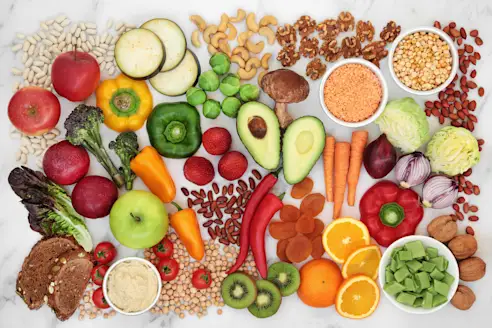The good news is that this chronic condition can often be prevented or managed through simple dietary adjustments. By adopting a balanced and low-sugar eating plan, one can significantly reduce the risk of developing diabetes type 2.
Prevent diabetes type 2 with diet by following a balanced and low-sugar eating plan, rich in fruits, vegetables, whole grains, lean proteins, and healthy fats. In today’s fast-paced world, where convenience foods and sedentary lifestyles are prevalent, the number of individuals diagnosed with type 2 diabetes is on the rise.
With these dietary changes in place, you can take charge of your health and minimize the likelihood of developing diabetes type 2.
Understanding Diabetes Type 2
Diabetes type 2 is a condition characterized by the body’s inability to properly use insulin to regulate blood sugar levels. In diabetes type 2, the body either doesn’t produce enough insulin or becomes resistant to its effects, resulting in high blood sugar levels.
| Age | Being overweight or obese | Inactivity |
| Family history | High blood pressure | High cholesterol levels |
| Ethnicity | Gestational diabetes | Polycystic ovary syndrome |
Pre-diabetes is a condition where blood sugar levels are higher than normal, but not yet high enough for a diabetes diagnosis. It is an opportunity for early intervention and lifestyle changes to prevent or delay the onset of diabetes type 2. Common tests to identify pre-diabetes include fasting plasma glucose test, oral glucose tolerance test, and A1C test.
Building A Diabetes-preventive Diet
Eating a balanced diet is crucial in preventing type 2 diabetes. Balancing macronutrients is a key aspect of adopting a diabetes-preventive diet. This involves including a combination of carbohydrates, proteins, and fats in your meals, while paying attention to portion sizes.
Incorporating fiber-rich foods into your diet is also essential. These foods, such as whole grains, fruits, and vegetables, not only help regulate blood sugar levels but also reduce the risk of developing diabetes.
On the other hand, it’s important to recognize foods to limit or avoid. Highly processed foods, sugary beverages, and trans fats should be minimized as they can increase the risk of diabetes.
Navigating Real-life Eating Scenarios
Maintaining a healthy diet can play a crucial role in preventing type 2 diabetes. To navigate real-life eating scenarios effectively, start by planning meals at home. Include a variety of nutrient-rich foods such as colorful fruits and vegetables, whole grains, lean proteins, and healthy fats.
Experiment with cooking techniques and flavors to keep meals interesting. Be mindful of portion sizes and limit your intake of sugary beverages and processed foods.
When dining out, it’s essential to make conscious choices that align with your diabetes prevention goals. Opt for grilled or baked options instead of fried foods. Request dressings and sauces on the side to control your intake. Be cautious of hidden sugars in condiments and choose water or unsweetened tea as your beverage. Consider sharing an entrée or ask for a half-sized portion to avoid overeating. Remember, moderation is key.
Special occasions, such as birthdays or holidays, may present challenges, but they can still be enjoyed while keeping your diabetes prevention efforts in mind. Plan ahead by selecting healthier options for your celebratory meals.
Allow yourself to indulge in your favorite treats but in limited amounts. Stay active during the day and incorporate physical activities like going for a walk or playing games with family and friends. By making deliberate choices, you can savor the moment while safeguarding your health.

Credit: www.healthcentral.com
Foods That Fight Against Diabetes Type 2
Foods that fight against diabetes Type 2 can be an effective way to prevent and manage the condition. Incorporating superfoods into your diet is an excellent starting point. Superfoods such as berries, leafy greens, and whole grains are rich in nutrients and fiber, which can help regulate blood sugar levels.
Herbs and spices like cinnamon and turmeric have been found to benefit insulin sensitivity, making them valuable additions to your meals. However, it is important to be cautious with sweeteners. While artificial sweeteners may seem like a good alternative to sugar, research suggests that they may still have an impact on blood sugar.
Opting for natural sweeteners like stevia or using small amounts of honey or maple syrup can be healthier choices. By making these dietary modifications and incorporating these foods, you can play an active role in preventing and managing diabetes Type 2.
Practical Diet Strategies To Prevent Diabetes Type 2
Reading and interpreting the information provided can help you make informed choices about the foods you consume. Pay attention to serving size, as it directly impacts the nutrients and calories you consume. Portion control plays a vital role in managing blood sugar levels and maintaining a healthy weight.
Be mindful of added sugars, sodium, and unhealthy fats in the ingredients list. Aim for low or no added sugars, opt for foods lower in sodium, and choose healthy fats like nuts, seeds, and avocados. A balanced plate is key to preventing diabetes type 2.
Fill half your plate with non-starchy vegetables, one-quarter with lean proteins, and one-quarter with whole grains or starchy vegetables. Balancing macronutrients ensures a steady release of glucose into the bloodstream, preventing spikes in blood sugar levels.
Lifestyle Factors Complementing Dietary Prevention
The role of physical activity in diabetes prevention: Regular physical activity plays a crucial role in preventing diabetes type 2. Engaging in moderate-intensity exercises such as brisk walking, cycling, or swimming for at least 30 minutes a day can help improve insulin sensitivity and assist in maintaining a healthy weight. It is best to incorporate strength training exercises twice a week to further enhance glucose control and metabolic health.
Managing stress for better metabolic health: Chronic stress can impact blood sugar levels and increase the risk of developing diabetes type 2. Employing stress management techniques ike deep breathing exercises, meditation, or yoga can help reduce stress and improve insulin sensitivity. Additionally, engaging in hobbies, spending time with loved ones, and practicing self-care activities can contribute to well-being.
Importance of sleep in regulating blood sugar: Adequate sleep is essential in maintaining healthy blood sugar levels. Lack of sleep, less than 7-8 hours a night, can disrupt insulin sensitivity and increase the risk of developing diabetes. Creating a regular sleep schedule, practicing a relaxing bedtime routine, and ensuring a comfortable sleeping environment are key to promoting quality sleep and supporting metabolic health.
Monitoring Progress And Staying Motivated
It’s important to have a clear vision of what you want to achieve and break it down into smaller, manageable steps. Start by looking at your current habits and identify areas that need improvement. Set specific goals for your diet, such as reducing sugar intake or increasing vegetable consumption.
To monitor your progress, track your dietary changes and keep a record of your blood sugar levels. This will help you identify patterns and make adjustments as needed. Use a food journal or a mobile app to log your meals and snacks.
Additionally, consider using a blood glucose monitor to regularly check your blood sugar levels. By reviewing your records, you can see how your diet affects your blood sugar and make informed decisions.
It’s important to celebrate milestones in your journey to health. Recognize and reward yourself for your achievements, whether it’s losing a certain amount of weight or successfully sticking to your new diet. This creates a sense of motivation and satisfaction, keeping you on track towards your long-term goals.
Find healthy ways to celebrate, such as treating yourself to a new workout gear or indulging in a relaxing spa day. Remember, every small victory matters and should be acknowledged.
Embracing A Holistic Approach To Preventing Diabetes Type 2
In today’s fast-paced and often sedentary lifestyle, preventing diabetes type 2 has become crucial. Embracing a holistic approach to this health concern is paramount. It’s important to note that other health conditions can impact the risk of developing diabetes type 2.
Conditions such as obesity, high blood pressure, and high cholesterol levels drastically increase the chances of diabetes onset. In such cases, consulting a nutritionist or dietician becomes essential in order to establish appropriate dietary guidelines and meal plans.
A nutritionist can provide tailored suggestions to help manage weight and control blood sugar levels. Additionally, mental health plays a vital role in dietary choices and overall well-being. Emotional eating or stress-induced meal patterns can further contribute to the development of diabetes type 2.
Conclusion
Adopting a healthy diet can play a crucial role in preventing the onset of Type 2 Diabetes. By eliminating processed foods, limiting sugary drinks, and opting for whole grains, lean proteins, and fruits and vegetables, you can control your blood sugar levels and maintain a healthy weight.
Incorporating regular exercise and making lifestyle changes will further enhance your efforts. By taking these proactive steps, you can significantly reduce the risk of developing diabetes and improve your overall health and well-being.
FAQs For How To Prevent Diabetes Type 2 With Diet
Can You Stop Type 2 Diabetes With Diet?
Yes, it is possible to manage type 2 diabetes through diet. By following a healthy eating plan, including a variety of fruits, vegetables, whole grains, lean proteins, and limiting processed foods and sugary drinks, you can help control blood sugar levels and improve overall health.
How Can Type 2 Diabetes Be Prevented?
To prevent type 2 diabetes: 1. Stay active with regular exercise, like walking or cycling. 2. Maintain a healthy weight by eating a balanced diet, low in sugar and processed foods. 3. Get regular check-ups and monitor blood glucose levels. 4.
Avoid smoking and limit alcohol consumption. 5. Reduce stress through relaxation techniques, like meditation or yoga.
What Is The Best Diet To Control Type 2 Diabetes?
The Mediterranean diet is considered the best diet to control type 2 diabetes. Its focus on fruits, vegetables, whole grains, lean proteins, and healthy fats can help manage blood sugar levels and promote overall health.
How Can I Reduce My Type 2 Diabetes Naturally?
To reduce type 2 diabetes naturally, focus on a healthy lifestyle. Maintain a balanced diet with low sugar and processed foods. Include regular exercise in your routine. Get enough sleep and manage stress levels. Limit alcohol consumption and avoid smoking. Regularly monitor blood sugar levels and consult a healthcare professional.

Nazmul Gazi is a dedicated final-year student at Cumilla Medical College with a passion for promoting health and wellness. Drawing from his medical studies, Nazmul writes insightful health tips and guides, helping readers make informed decisions about their well-being.

